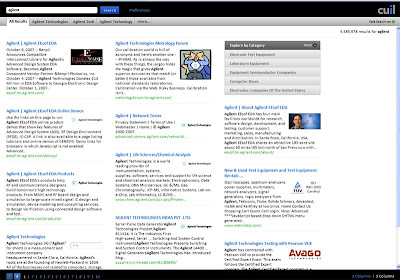 Former Google employees have launched a new search engine in an attempt to rival Google. Cuil claims to index three times as many web pages as any other search engine.
Former Google employees have launched a new search engine in an attempt to rival Google. Cuil claims to index three times as many web pages as any other search engine.Cuil, pronounced cool, uses about 120 billion web pages to create its index of information. What's with the name Cuil? Well Cuil is Gaelic word meaning knowledge! The site's founders claim that this is more than Google uses, however, Google has stopped reporting how many it indexes.
Cuil's uses search technology which ranks results by the content on each webpage, not by its popularity. It then carefully organizes similar search results into groups and sorts them by category. The results are displayed in a magazine style format, rather than a list. The site looks very boring and lacks colour, It appears that they are trying to stick clear of looking anything like Google as the site is almost the polar opposite of Google, using a black background with grey and blue colours.
Cuil's technology was developed by a team led by Tom Costello and Anna Patterson. between the two of them they have developed search engines at Stanford University and IBM, and worked for Google. Russell Power, Patterson’s former colleague from Google is also involved and is a co founder of Cuil.
Costello stated the follow when Cuil was launched: "The web continues to grow at a fantastic rate and other search engines are unable to keep up with it. Our significant breakthroughs in search technology have enabled us to index much more of the internet, placing nearly the entire web at the fingertips of every user." Unlike Google, Cuil does not keep any personally identifiable information on users or their search histories. Due to the site's search method, personal data collection is unnecessary.
I gave it a try and will not be using it again anytime soon. It brings up loads of results, but unfortunately they're mostly irrelevant and useless. I really like the format, but who cares what it looks like if it doesn't work well! It seemed to have a major problem when I searched for more than one word. In some cases it couldn't even find any sites! whole Google showed 830 sites for the same keyword I searched......and they were relevant.